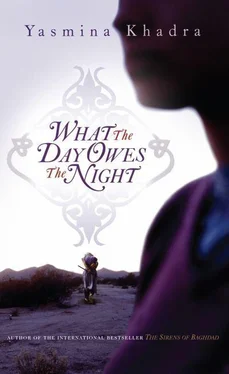Every day these women would gather around the well and spend most of their time turning over the past as you might turn a knife in an old wound. They talked about the orange groves that had been repossessed, of blue hills lost for ever, of kinfolk left behind, of a land of misfortune that they might never see again. And as they talked, their faces sagged with heartache, their voices cracked, but just when sorrow seemed about to overwhelm them, Badra would interrupt with some new outrageous tale of her first husband’s sexual disasters and, like a magic potion, the painful memories would loosen their grip, the women would fall about with laughter and the courtyard regained a small part of its soul.
The jokes and stories would go on until nightfall. Sometimes, emboldened by the absence of the men, Bliss, the broker, would come and strut about. As soon as they heard him loudly clear his throat, the women would disappear, then he would stride into the courtyard, shout at the children, look for any rubbish and call us vermin if he found the slightest scratch on the walls. He would stand in the middle of the courtyard staring pointedly at the room where the beautiful Hadda lived and, loathsome as a one-eyed flea, threaten to turn us all out on to the street. After he had gone, the women would reappear, giggling, more amused than intimidated by the man’s bluster. And Bliss could certainly brag, though he was not up to his boasts. He would not have dared show his face in the courtyard if there were a man present – even if it were only a man on his deathbed. Badra was convinced that Bliss had designs on Hadda. Destitute and vulnerable, the girl would be easy prey, her position made more precarious by the fact that she was in arrears on her rent. Bliss constantly bullied her hoping she would break.
To protect me from Badra’s vulgar tongue, my mother allowed me to go out and play in the street – if it could be called a street. It was a dirt road lined on either side with hovels made of corrugated iron and squalid little shacks. There were only two houses built of bricks and mortar: the courtyard house where we lived, and a sort of stable where a number of families lived cramped together. On the corner of the street was a barber, a small man of indeterminate age, barely taller than a stick of asparagus and so timorous that some refused to pay for their haircuts. Inside his tiny roofless cabin were a munitions case salvaged from a military dump, a sliver of mirror rescued from a wardrobe and a rickety counter on which sat a large jug, a tattered shaving brush, a bent pair of scissors and an assortment of blunt razor blades. When he was not shaving old men, he squatted on the ground outside his shack and sang. His voice was hoarse and gravelly, he could barely remember the words to the songs, yet there was something thrilling in the way he poured out his pain. I never tired of listening to him.
Next to the barber’s was a ramshackle lean-to that served as a grocer’s shop. The shopkeeper was known as Peg-Leg – a Moroccan veteran who had lost his leg in a minefield. This was the first time I had ever seen a wooden leg. It made a strange impression on me. The ex-soldier seemed proud of it; he would pull it off and brandish it like a weapon at any boy he found trying to pilfer from his jars.
Peg-Leg was not happy in his little shop. He missed the reek of battle and the noise of the barracks. He dreamed of re-enlisting, of going into battle again and tearing the enemy to shreds. As he waited for his mutilated leg to grow back, he ran a thriving black market in jam, sugar loaves and rancid cooking oil. In his spare time he was a back-street dentist; many times I watched him pull rotten, bloody stumps from children’s mouths with a pair of rusty pliers; it was as though he was ripping their hearts out.
Beyond Peg-Leg’s shack was a patch of waste ground that opened on to scrubland. I wandered out there one morning and witnessed a battle between two rival armies of children, one led by Daho – a savage child, his head shaven but for a lock of hair that fell over his forehead – the other by a young man who seemed to be mentally retarded and thought he was a warrior king. It was as if the earth had opened up beneath my feet. In a split second I was seized by a forest of arms, and before I knew what was happening they had stripped me of my shoes, my gandurah and my fez. They even tried to drag me into the bushes and dishonour me. Shocked and traumatised, I’m not sure how I escaped the pack, but I never set foot in the waste ground again.
My father spent every hour of the day looking for a job, but still the situation was bleak. Every day at dawn, thousands of men went out looking for work. As wretches lay dying on the rubbish tips, their bellies so emaciated you could almost see their spines, the living seemed only too ready to tear each other to pieces over a stale crust of bread. Times were hard. The dreams the city seemed to promise from afar had proved illusory. My father was lucky if he managed to get one day’s labour in every ten, and the money he earned was barely enough to buy the sliver of soap to wash himself with. Some nights he would stagger home, his face haggard, his back stooped from a day spent loading and unloading, in so much pain that he had to sleep on his stomach. He was exhausted, but most of all he was desperate. His resolve began to crack under the weight of his doubts.
Weeks passed. My father was visibly losing weight. He was increasingly short-tempered and at the slightest excuse would take out his frustration on my mother. He never hit her, but he would scream at her and she would guiltily bow her head and say nothing. The days slipped away from us, the nights loomed large. My father no longer slept. He spent his nights sighing, clapping his hands, I would hear him pacing the room in the dark; sometimes he would go out into the courtyard and sit, chin on his knees, arms clasped around his legs, and wait for sun-up.
One morning he told me to put on my best gandurah and together we walked to his brother’s chemist’s shop, where we found my uncle setting out his boxes and vials on the shelves.
My father hesitated before stepping into the shop. Proud and tongue-tied, he dithered for a long time before admitting why we had come. He needed money. My uncle, as though he had been expecting this, immediately opened the cash register and took out a large banknote. My father stared at the money in anguish. Realising he would not take the money, my uncle stepped from behind the counter and slipped it into his pocket. My father stood, frozen, hanging his head, and his voice when he finally spoke was faint, muffled, barely audible: ‘Thank you.’
My uncle went back behind his counter. It was obvious that there was something he wanted to say, but he dared not burst the blister. His eyes flickered from my father’s face to his own scrubbed white fingers drumming on the countertop. Having weighed the situation with infinite care, he took his courage in both hands and said:
‘I know it’s hard, Issa, but you’ll get through this. If you’d only let me help you a little.’
‘I’ll pay you back every last penny,’ my father promised.
‘I’m not worried about the money, Issa, pay me back whenever you can. As far as I am concerned, you don’t need to pay me back at all. I can give you more. It’s no problem. I’m your brother, and I’m here for you, whenever you need me. I don’t know how to say this to you . . .’ He cleared his throat. ‘I’ve always found it difficult to talk to you. I’m afraid I will offend you, though all I want to do is be a brother to you. But it’s time you learned to listen, Issa. There’s nothing wrong in listening. Life is a constant learning process: the more you think you know, the less you actually know; things change so quickly, attitudes change . . .’
Читать дальше












